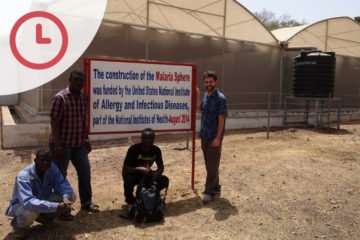Podcast Available on iTunes and Spotify.
Welcome back to Five Minutes, the podcast series where we speak to the most interesting people in the world of malaria.
Joining me today are Dr Mike Coleman and Kirsten Duda of the Liverpool School of Tropical Medicine. They work for ETCH which stands for Engaging Tools for Communication in Health.
They’ve helped to create an app called Resistance 101. It’s an arcade-style game that makes understanding the concepts of insecticide resistance much more accessible and engaging.
It’s available to download on iTunes and the Google Play store.
This is Five Minutes with Dr Mike Coleman and Kirsten Duda.
Thank you for joining me.
[MIKE]: Pleasure
[KIRSTEN]: Thank you.
Why did you decide to create the Resistance 101 game?
[MIKE]: I think part of the problem was that we’ve been working in insecticide resistance and insecticide resistance management in particular for a number of years now, and one of the big issues has always been that countries partners don’t have the capacity or haven’t had the knowledge transfer to deal with this information themselves. More traditional, didactic teaching hasn’t worked so we wanted to create a game which anyone could access, anyone could play and a lot of the knowledge would be transferred to them at the same time.
I’ve played the game myself and it starts off incredibly easy and then it does get more difficult. You say that anyone can access it, with that in mind, who is this game for?
So, our original market was the control programmes themselves, the people in the field who are trying to deliver these interventions to control diseases like malaria. But having said that, it has expanded. We’ve started to use it in the Master’s courses we did here at the Liverpool School. Now we are starting to run programmes to come up to Liverpool to not only have the element of the gaming learning, but also other more traditional styles of learning, whether it be teaching in the lecture theatre, or in the laboratories.
What goes into making a game like Resistance 101?
[KIRSTEN]: Quite a lot! What we did is we initially sat down with various different experts in the field of vector control to determine what were some of the problems and what were some of the key themes and elements that needed to be translated to the people who were going to be learning this material. Then we need to sit down with the game developers to determine how we were going to transfer that information in a game format that would be appealing to the audience. And then you have various different iterations of the game that comes up as a result of that and you end up with trialling it within your initial team that worked on the development and then having beta testing where you can test a subset of what your target audience might be to have them play the game and assess it and provide feedback on these different elements and whether or not they learnt anything or if they thought they learnt anything.
The game was launched earlier this year at the Multilateral Initiative on Malaria in Dakar. What sort of response have you had since the launch?
We’ve had a really positive response across the board, particularly with the staff in Ethiopia and Zambia. People went from saying that they had never played a video game before and being shy about thinking about it as a learning tool, to embracing it and enthusiastically requesting more and saying that it really helped to facilitate their learning and allowed them to have a tool where they could refresh their memory.
What sort of educational tools were available on the market before Resistance 101 came about?
[MIKE]: Mainly textbooks and lecture styles that were given in that traditional way of teaching that has been didactic, which I think is the best way of describing it.
Dr Mike Coleman and Kirsten Duda, thank you.
[KIRSTEN]: Thank you.
[MIKE]: Thank you.


